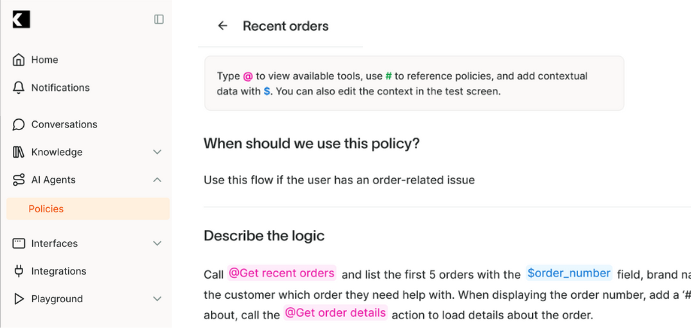Ingredients
The systems utilized by this policy are EasyPost, Gorgias, and Kodif.
What are AI Policies?

At Kodif, we’re excited to announce the launch of Policies—a powerful, dynamic solution designed to revolutionize the way CX managers handle customer support. Unlike traditional flows, which are rigid and complex, Policies empower non-technical users to create and manage customer interactions with ease. Written in natural language, Policies make it simple to define and refine customer experiences without needing to rely on complicated flowcharts or scripting. This approach is not only user-friendly but also self-serve, enabling CX teams to quickly translate existing Standard Operating Procedures (SOPs) into automation, saving valuable time and resources.
The flexibility of Kodif Policies ensures that businesses can offer personalized, context-driven support while continuously improving customer experiences. With Policies, you can experiment with different strategies to optimize outcomes such as CSAT, revenue, and retention—all without the need to rebuild complex workflows. Whether it’s automating routine interactions or testing new approaches for high-stakes scenarios, Policies provide a scalable, adaptable solution that aligns with your business goals. While flows still have their place in sensitive, high-risk situations, Policies offer an agile alternative that helps businesses innovate faster and deliver exceptional, tailored experiences at scale.
“WISMO” Ticket Type Explained
“WISMO,” or “Where Is My Order?” refers to a common type of customer support inquiry in the realm of e-commerce. Customers often contact businesses to inquire about the status, location, or estimated delivery time of their orders after a purchase. These inquiries are crucial touchpoints in the customer journey, as they directly affect customer satisfaction and trust. Efficiently handling WISMO tickets can significantly enhance the customer experience by providing timely and accurate information, reducing anxiety and uncertainty about deliveries.
Which Platforms Does This AI Policy Work On?
This AI policy is designed to work seamlessly on EasyPost, Gorgias, and Kodif. Moreover, Kodif integrates with all other major platforms, ensuring broad compatibility and ease of use across various e-commerce environments.
When Should I Use This Policy?
This policy is ideal for use when customers want to know the status of their orders. By automating responses to WISMO inquiries, businesses can provide quick and accurate updates, ensuring customer satisfaction and freeing up human agents for more complex issues.
Policy Logic
The logic for implementing this policy involves a series of automated steps designed to efficiently address WISMO inquiries. Here’s a breakdown:
- Ask for the User’s Email Address
- Use @get_gorgias_account_details to check if the user with that email address exists in the system.
- If the email address is not found, request a valid email address.
-
If the email address is still not found, route the inquiry to an agent for further investigation.
-
Display Recent Orders
- Use @get_gorgias_orders to retrieve the user’s recent orders.
- Display the list of recent orders and ask the user which specific order they would like to inquire about.
-
If the order is not found, route it to an agent for further investigation.
-
Check Order Status
- For the selected order, retrieve the shipping status using @easypost_order_details(order_id: str).
- If “Approved,” inform the customer that the order is approved and awaiting processing.
- If “Processing,” inform the customer that the order is processed and awaiting shipment.
- If “Pending Shipment,” inform the customer and provide a shipment date.
- If “Shipped,” inform the customer and provide the tracking number.
- If “In Transit,” check if the order is within the estimated delivery date using the same tool. Inform the customer about the expected delivery date, or let them know if there’s a delay and that the request will be transferred to an agent for investigation.
- If “Delivered,” confirm with the customer that the order was received.
- If the order was not delivered, route it to an agent or create a ticket to escalate the issue.
- If “Canceled,” inform the customer that the order has been canceled.
Example Policy
To implement this policy, you just need to describe the steps as outlined above, using specific functions indicated with the @ sign. Adjust the commands to reflect the right platforms, such as using @easypost_order_details for EasyPost. Once set, activate the policy on your preferred channels (chat, email, etc.), and it will immediately begin serving your customers.


